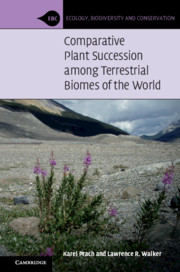Book contents
- Comparative Plant Succession among Terrestrial Biomes of the World
- Ecology, Biodiversity, and Conservation
- Comparative Plant Succession among Terrestrial Biomes of the World
- Copyright page
- Contents
- Preface
- 1 Introduction
- Part I Plant Succession and Biomes
- Part II Succession by Disturbance Type
- 4 Comparative Approach
- 5 Volcanoes
- 6 Glaciers
- 7 Cyclones
- 8 Dunes
- 9 Landslides
- 10 Floods
- 11 Fire
- 12 Clearcuts
- 13 Plowed Fields
- 14 Mines
- 15 Other Disturbances
- Part III Synthesis
- Book part
- References
- Index
5 - Volcanoes
from Part II - Succession by Disturbance Type
Published online by Cambridge University Press: 08 May 2020
- Comparative Plant Succession among Terrestrial Biomes of the World
- Ecology, Biodiversity, and Conservation
- Comparative Plant Succession among Terrestrial Biomes of the World
- Copyright page
- Contents
- Preface
- 1 Introduction
- Part I Plant Succession and Biomes
- Part II Succession by Disturbance Type
- 4 Comparative Approach
- 5 Volcanoes
- 6 Glaciers
- 7 Cyclones
- 8 Dunes
- 9 Landslides
- 10 Floods
- 11 Fire
- 12 Clearcuts
- 13 Plowed Fields
- 14 Mines
- 15 Other Disturbances
- Part III Synthesis
- Book part
- References
- Index
Summary
Volcanoes are the most destructive type of natural disturbance on earth and have been instrumental in the development of continents, mountain ranges, and the destruction of life at global and regional scales. Even today, lava produced by volcanoes is creating new land in Hawaii and other volcanic hotspots. Lava flows that obliterate all previous life are the clearest example of a natural disturbance that initiates primary succession. Initially, there is no available nitrogen or organic matter on a fresh lava flow but other elements (including phosphorus) are present, so when deficiencies are addressed, soils and plant communities can develop. Humans are often drawn to volcanoes because of the rich soils that can result. Indeed, about 12% of all humans live on or within 100 km of an active volcano (“active” in geological terms means erupting within the last 10,000 years) (Small & Neumann, 2001). We start our discussion with volcanic disturbance because it is the least influenced by humans of all disturbance regimes.
- Type
- Chapter
- Information
- Publisher: Cambridge University PressPrint publication year: 2020

